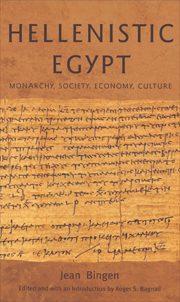Book contents
- Frontmatter
- Contents
- Original Sources of Chapters
- List of illustrations
- Glossary
- Maps
- Foreword
- Introduction: Jean Bingen and the currents of Ptolemaic history
- Part I The Monarchy
- Part II The Greeks
- 6 The Thracians in Ptolemaic Egypt
- 7 Ptolemaic papyri and the Achaean diaspora in Hellenistic Egypt
- 8 Greek presence and the Ptolemaic rural setting
- 9 The urban milieu in the Egyptian countryside during the Ptolemaic period
- 10 Kerkeosiris and its Greeks in the second century
- 11 The cavalry settlers of the Herakleopolite in the first century
- 12 Two royal ordinances of the first century and the Alexandrians
- Part III The Royal Economy
- Part IV Greeks and Egyptians
- Conclusion
- Bibliography
- General index
- Index of passages discussed
- HELLENISTIC CULTURE AND SOCIETY
8 - Greek presence and the Ptolemaic rural setting
from Part II - The Greeks
- Frontmatter
- Contents
- Original Sources of Chapters
- List of illustrations
- Glossary
- Maps
- Foreword
- Introduction: Jean Bingen and the currents of Ptolemaic history
- Part I The Monarchy
- Part II The Greeks
- 6 The Thracians in Ptolemaic Egypt
- 7 Ptolemaic papyri and the Achaean diaspora in Hellenistic Egypt
- 8 Greek presence and the Ptolemaic rural setting
- 9 The urban milieu in the Egyptian countryside during the Ptolemaic period
- 10 Kerkeosiris and its Greeks in the second century
- 11 The cavalry settlers of the Herakleopolite in the first century
- 12 Two royal ordinances of the first century and the Alexandrians
- Part III The Royal Economy
- Part IV Greeks and Egyptians
- Conclusion
- Bibliography
- General index
- Index of passages discussed
- HELLENISTIC CULTURE AND SOCIETY
Summary
How far Greeks were present in or absent from the Egyptian countryside is no minor aspect of the organisation of rural space in Ptolemaic Egypt. Perhaps the problem would be unimportant if it were limited, for instance, to the mere study of some of the more extensive agricultural enterprises. But it is fundamental as soon as we remember that one of the underlying elements in any structural analysis of Ptolemaic Egypt is the coexistence of two groups, a dominant Graeco-Macedonian minority and an Egyptian majority, the more so in that the zones of mixture or transfer between the two groups were relatively restricted. Its fundamental character comes to the fore, also, as soon as one realises that the organisation of rural space and the relations between any form of more or less urbanised centre and the surrounding country appear in our case different from those in Greek archaic or classical societies, for instance where the town organised around itself a self-managed space or organised exchanges by using a nearby space, the management of which was left to other people. We are also far, and not only geographically, from situations such as have been described for some parts of the postclassical Black Sea coast.
Indeed, in Hellenistic Egypt the problem is on quite another scale. If there was reorganisation of rural space (we are not able to quantify the dimensions of this reorganisation, but it was important), it was a matter of measures of wide application, often linked with the royal treasury, with modalities foreseen for all the realm.
- Type
- Chapter
- Information
- Hellenistic EgyptMonarchy, Society, Economy, Culture, pp. 104 - 113Publisher: Edinburgh University PressPrint publication year: 2007



